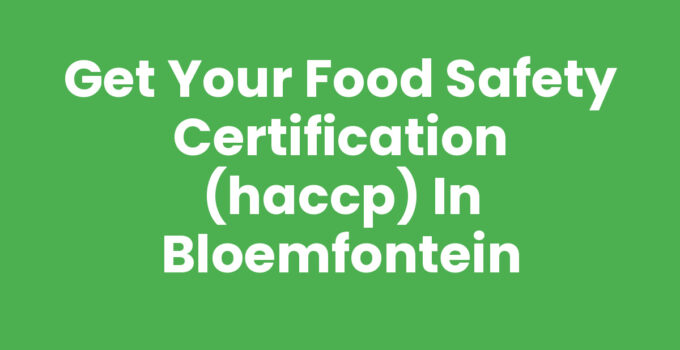In the modern world, food safety is paramount. With increasing concerns over foodborne illnesses and the demand for high-quality food products, obtaining a Food Safety Certification like HACCP (Hazard Analysis and Critical Control Points) is essential for businesses in the food industry. In Bloemfontein, understanding the steps to achieve HACCP certification can greatly enhance your operations, build customer trust, and ensure regulatory compliance. This guide provides in-depth information and practical steps on how to secure your Food Safety Certification in Bloemfontein.
Food Safety Certification (HACCP): A Step-by-Step Guide
The process of obtaining HACCP certification is detailed but achievable. Here’s a step-by-step guide to navigate through it:
Step 1: Understand HACCP Principles
HACCP is based on seven principles that form the foundation of any good food safety system. These include:
- Conduct a hazard analysis: Identify potential hazards that could affect food safety.
- Determine critical control points (CCPs): Points where control can be applied to prevent hazards.
- Establish critical limits: Set maximum and minimum limits for each CCP.
- Monitor CCPs: Implement monitoring procedures to ensure each CCP stays within its limits.
- Establish corrective actions: Outline steps to control deviations when limits are not met.
- Verification: Use testing and other methods to ensure HACCP is working effectively.
- Documentation: Maintain records to demonstrate compliance and for auditing purposes.
Understanding these principles is fundamental before embarking on the certification process.
Step 2: Training and Preparation
Before applying for HACCP certification, ensure that you and your team have adequate training. There are many accredited training programs in Bloemfontein offering HACCP courses:
- Identify reputable training providers.
- Enrol in a comprehensive HACCP training course.
- Ensure staff members involved in food safety practices are trained.
Training will provide your team with the necessary knowledge and skills to implement HACCP principles effectively.
Step 3: Develop a HACCP Plan
A detailed HACCP plan must be developed for your business, aligned with its specific products and processes. This plan should include:
- Your specific food processes.
- Identified hazards and corresponding control measures.
- Monitoring methods for CCPs.
- Corrective actions for potential deviations.
- Record-keeping methods to document compliance.
Creating a tailored HACCP plan is critical for certification success.
Step 4: Application and Certification
With your HACCP plan in place, it’s time to apply for certification. The following steps generally apply:
- Choose a certified HACCP accreditation body in Bloemfontein.
- Submit your HACCP plan and any required documentation.
- Prepare for an audit, where the accreditation body will evaluate your processes.
Once the audit is successfully completed, you will receive your HACCP certification, signifying your commitment to food safety.
Benefits of Obtaining HACCP Certification
Choosing to obtain HACCP certification encompasses various advantages:
- Enhanced Food Safety: A systematic approach significantly lowers the risk of foodborne illnesses.
- Increased Customer Trust: Certification serves as proof of your commitment to quality, improving brand loyalty.
- Compliance with Regulations: Meet local and international food safety regulations, avoiding costly penalties.
- Competitive Advantage: Stand out in the market with recognized certification, attracting more customers.
These benefits clearly demonstrate why HACCP certification is vital for food businesses in Bloemfontein.
Key Considerations for Food Safety Certification in Bloemfontein
As you move forward in the certification process, keep the following factors in mind:
- Consistent Monitoring: Ensure that food safety standards are continuously monitored and updated.
- Cultural Adaptation: Adapt your HACCP practices to accommodate local food handling practices prevalent in Bloemfontein.
- Regular Training: Continuous education for staff is essential to maintain compliance and high safety standards.
Remaining vigilant about these considerations will help you maintain your certification efficiently.
Conclusion
Food Safety Certification (HACCP) in Bloemfontein is a crucial step for any food business committed to excellence in safety and quality. By following the outlined steps, you can successfully achieve certification, benefitting from improved safety, enhanced consumer trust, and regulatory compliance. As you navigate this process, remember that the goal is not just to achieve certification but to create a culture of food safety that permeates every aspect of your operation.
Frequently Asked Questions
What is HACCP?
HACCP stands for Hazard Analysis and Critical Control Points. It’s a systematic preventive approach to food safety that addresses physical, chemical, and biological hazards.
Why is HACCP certification important?
HACCP certification is important as it ensures your food safety practices meet globally recognized standards, minimizing health risks and enhancing product quality.
How long does it take to obtain HACCP certification?
The timeframe for obtaining HACCP certification can vary, but it usually takes between three to six months depending on your preparation and the complexity of your operations.



